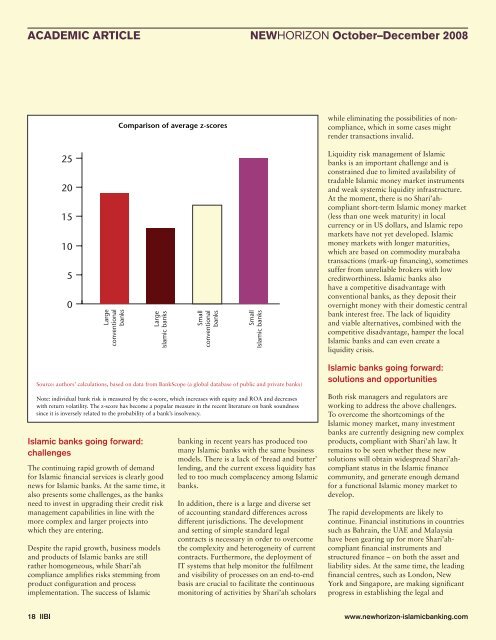azerbaijan: emerging market islamic banking and finance
azerbaijan: emerging market islamic banking and finance
azerbaijan: emerging market islamic banking and finance
Create successful ePaper yourself
Turn your PDF publications into a flip-book with our unique Google optimized e-Paper software.
ACADEMIC ARTICLE<br />
NEWHORIZON October–December 2008<br />
Comparison of average z-scores<br />
while eliminating the possibilities of noncompliance,<br />
which in some cases might<br />
render transactions invalid.<br />
Liquidity risk management of Islamic<br />
banks is an important challenge <strong>and</strong> is<br />
constrained due to limited availability of<br />
tradable Islamic money <strong>market</strong> instruments<br />
<strong>and</strong> weak systemic liquidity infrastructure.<br />
At the moment, there is no Shari’ahcompliant<br />
short-term Islamic money <strong>market</strong><br />
(less than one week maturity) in local<br />
currency or in US dollars, <strong>and</strong> Islamic repo<br />
<strong>market</strong>s have not yet developed. Islamic<br />
money <strong>market</strong>s with longer maturities,<br />
which are based on commodity murabaha<br />
transactions (mark-up financing), sometimes<br />
suffer from unreliable brokers with low<br />
creditworthiness. Islamic banks also<br />
have a competitive disadvantage with<br />
conventional banks, as they deposit their<br />
overnight money with their domestic central<br />
bank interest free. The lack of liquidity<br />
<strong>and</strong> viable alternatives, combined with the<br />
competitive disadvantage, hamper the local<br />
Islamic banks <strong>and</strong> can even create a<br />
liquidity crisis.<br />
Source: authors’ calculations, based on data from BankScope (a global database of public <strong>and</strong> private banks)<br />
Note: individual bank risk is measured by the z-score, which increases with equity <strong>and</strong> ROA <strong>and</strong> decreases<br />
with return volatility. The z-score has become a popular measure in the recent literature on bank soundness<br />
since it is inversely related to the probability of a bank’s insolvency.<br />
Islamic banks going forward:<br />
challenges<br />
The continuing rapid growth of dem<strong>and</strong><br />
for Islamic financial services is clearly good<br />
news for Islamic banks. At the same time, it<br />
also presents some challenges, as the banks<br />
need to invest in upgrading their credit risk<br />
management capabilities in line with the<br />
more complex <strong>and</strong> larger projects into<br />
which they are entering.<br />
Despite the rapid growth, business models<br />
<strong>and</strong> products of Islamic banks are still<br />
rather homogeneous, while Shari’ah<br />
compliance amplifies risks stemming from<br />
product configuration <strong>and</strong> process<br />
implementation. The success of Islamic<br />
<strong>banking</strong> in recent years has produced too<br />
many Islamic banks with the same business<br />
models. There is a lack of ‘bread <strong>and</strong> butter’<br />
lending, <strong>and</strong> the current excess liquidity has<br />
led to too much complacency among Islamic<br />
banks.<br />
In addition, there is a large <strong>and</strong> diverse set<br />
of accounting st<strong>and</strong>ard differences across<br />
different jurisdictions. The development<br />
<strong>and</strong> setting of simple st<strong>and</strong>ard legal<br />
contracts is necessary in order to overcome<br />
the complexity <strong>and</strong> heterogeneity of current<br />
contracts. Furthermore, the deployment of<br />
IT systems that help monitor the fulfilment<br />
<strong>and</strong> visibility of processes on an end-to-end<br />
basis are crucial to facilitate the continuous<br />
monitoring of activities by Shari’ah scholars<br />
Islamic banks going forward:<br />
solutions <strong>and</strong> opportunities<br />
Both risk managers <strong>and</strong> regulators are<br />
working to address the above challenges.<br />
To overcome the shortcomings of the<br />
Islamic money <strong>market</strong>, many investment<br />
banks are currently designing new complex<br />
products, compliant with Shari’ah law. It<br />
remains to be seen whether these new<br />
solutions will obtain widespread Shari’ahcompliant<br />
status in the Islamic <strong>finance</strong><br />
community, <strong>and</strong> generate enough dem<strong>and</strong><br />
for a functional Islamic money <strong>market</strong> to<br />
develop.<br />
The rapid developments are likely to<br />
continue. Financial institutions in countries<br />
such as Bahrain, the UAE <strong>and</strong> Malaysia<br />
have been gearing up for more Shari’ahcompliant<br />
financial instruments <strong>and</strong><br />
structured <strong>finance</strong> – on both the asset <strong>and</strong><br />
liability sides. At the same time, the leading<br />
financial centres, such as London, New<br />
York <strong>and</strong> Singapore, are making significant<br />
progress in establishing the legal <strong>and</strong><br />
18 IIBI www.newhorizon-<strong>islamic</strong><strong>banking</strong>.com
















